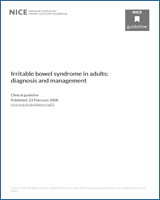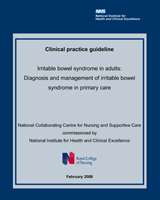NCBI Bookshelf. A service of the National Library of Medicine, National Institutes of Health.
Update information March 2017 Recommendation 1.1.1.2 in the short version was updated by NICE with more recent guidance on recognition and referral for suspected cancer. Recommendation 1.1.1.3 in the short version was removed as it was no longer needed after the changes to recommendation 1.1.1.2. February 2015 NICE has made new recommendations relating to the clinical management (dietary and lifestyle advice, and pharmacological therapy) of people with IBS. The recommendations and evidence in sections 3, 7.6, 8.4, 8.5.2 and 9.1 of this guideline that have been highlighted in grey have been stood down and replaced. New recommendations on dietary and lifestyle advice, and pharmacological therapy, can be found in the irritable bowel syndrome in adults update CG61.1. September 2012 A recommendation in this guideline (see pages 28 and 37) has been partially updated by recommendation 1.1.2.1 in 'Ovarian cancer' (NICE clinical guideline 122, 2011).
Excerpt
This guideline covers areas relevant to the diagnosis and management of irritable bowel syndrome (IBS) reflecting the complete patient journey, from the person presenting with IBS symptoms, positive diagnosis and management, targeted at symptom control. The guideline incorporates Cochrane reviews, published NICE clinical and public health guidance, Health Technology Assessment reports, systematic and health economic reviews produced by the National Collaborating Centre for Nursing and Supportive Care. Recommendations are based on clinical and cost effectiveness evidence, and where this is insufficient, the GDG used all available information sources and experience to make consensus recommendations using nominal group technique.
Contents
- Guideline development group membership and acknowledgements
- Abbreviations
- General glossary
- 1. Executive summary, key recommendations and IBS algorithm
- 2. Principles of practice
- 3. Summary of recommendations
- 4. Aims of the guideline
- 5. Methods used to develop the guideline
- 6. Diagnosis
- INTRODUCTION AND BACKGROUND
- OBJECTIVES
- SELECTION CRITERIA
- SEARCH STRATEGY FOR IDENTIFICATION OF THE LITERATURE
- METHODOLOGY
- STRUCTURE OF THE REVIEW
- IBS DIAGNOSTIC CRITERIA
- RESULTS OF THE REVIEW AND DISCUSSION
- GDG DISCUSSION
- UTILITY OF TESTS TO EXCLUDE ALTERNATIVE DIAGNOSES
- ECONOMIC EVIDENCE ON DIAGNOSTIC TESTS TO IDENTIFY ALTERNATIVE DIAGNOSES
- SUMMARY OF THE EVIDENCE
- GDG COMMENTARY
- EVIDENCE STATEMENTS
- Appendix 1. Sensitivity and specificity values offered as Odds Ratios
- Appendix 2. Comparison table for Rome Criteria
- Appendix 3. PATIENT PROFILES FOR SIMULATED GP CONSULTATION
- 7. Diet and lifestyle
- 8. Pharmacological interventions
- 9. Psychosocial interventions
- 10. Complementary and alternative therapies
- 11. Psychosocial interventions: patient information and support groups
- 12. Recommendations for research
- 13. Implementation of the guideline
- 14. Related NICE guidance
- 15. Update of the guideline
- 16 References
- Appendix A. Registered stakeholders
- Appendix B. Search strategies and databases searched
- Appendix C. Characteristics of included studies
- Appendix D. Quality assessment of studies
- Appendix E. Excluded studies
- Appendix F. Grading the evidence
- Appendix G. Literature review of prognostic, resource use and quality of data
- Appendix H. Parameter distributions used in the probabilistic sensitivity analysis
- Appendix I. Bristol Stool Form Scale
- Appendix J. The General Practice Physical Activity Questionnaire (GPPAQ)
- Appendix K. Declarations of interests
Based at the Royal College of Nursing, the NCCNSC is a partnership of organisations brought together for the purposes of supporting the development of NICE clinical practice guidelines. The partnership is comprised of representatives from the following organisations: Centre for Evidence-Based Medicine, University of York; Clinical Effectiveness Forum for Allied Health Professions; Healthcare Libraries, University of Oxford; Health Economics Research Centre, University of Oxford; Royal College of Nursing; UK Cochrane Centre.
Terminology
Where the term ‘carer’ is used, this refers to unpaid carers as opposed to paid careworkers.
Disclaimer
As with any clinical practice guideline, the recommendations contained in this guideline may not be appropriate in all circumstances. A limitation of a guideline is that it simplifies clinical decision-making (Shiffman 1997). Decisions to adopt any particular recommendations must be made by practitioners in the context of:
- Available resources
- Local services, policies and protocols
- The circumstances and wishes of the patient
- Available personnel and devices
- Clinical experience of the practitioner
- Knowledge of more recent research findings
- The diagnosis of IBS in primary care: consensus development using nominal group technique.[Fam Pract. 2006]The diagnosis of IBS in primary care: consensus development using nominal group technique.Rubin G, De Wit N, Meineche-Schmidt V, Seifert B, Hall N, Hungin P. Fam Pract. 2006 Dec; 23(6):687-92. Epub 2006 Oct 24.
- Review Violence: The Short-Term Management of Disturbed/Violent Behaviour in In-Patient Psychiatric Settings and Emergency Departments[ 2005]Review Violence: The Short-Term Management of Disturbed/Violent Behaviour in In-Patient Psychiatric Settings and Emergency DepartmentsNational Collaborating Centre for Nursing and Supportive Care (UK). 2005 Feb
- Review Irritable bowel syndrome: a clinical review.[JAMA. 2015]Review Irritable bowel syndrome: a clinical review.Chey WD, Kurlander J, Eswaran S. JAMA. 2015 Mar 3; 313(9):949-58.
- Review British Dietetic Association systematic review of systematic reviews and evidence-based practice guidelines for the use of probiotics in the management of irritable bowel syndrome in adults (2016 update).[J Hum Nutr Diet. 2016]Review British Dietetic Association systematic review of systematic reviews and evidence-based practice guidelines for the use of probiotics in the management of irritable bowel syndrome in adults (2016 update).McKenzie YA, Thompson J, Gulia P, Lomer MC, (IBS Dietetic Guideline Review Group on behalf of Gastroenterology Specialist Group of the British Dietetic Association). J Hum Nutr Diet. 2016 Oct; 29(5):576-92. Epub 2016 Jun 6.
- Review Homeopathy for treatment of irritable bowel syndrome.[Cochrane Database Syst Rev. 2013]Review Homeopathy for treatment of irritable bowel syndrome.Peckham EJ, Nelson EA, Greenhalgh J, Cooper K, Roberts ER, Agrawal A. Cochrane Database Syst Rev. 2013 Nov 13; (11):CD009710. Epub 2013 Nov 13.
- Irritable Bowel Syndrome in AdultsIrritable Bowel Syndrome in Adults
Your browsing activity is empty.
Activity recording is turned off.
See more...

